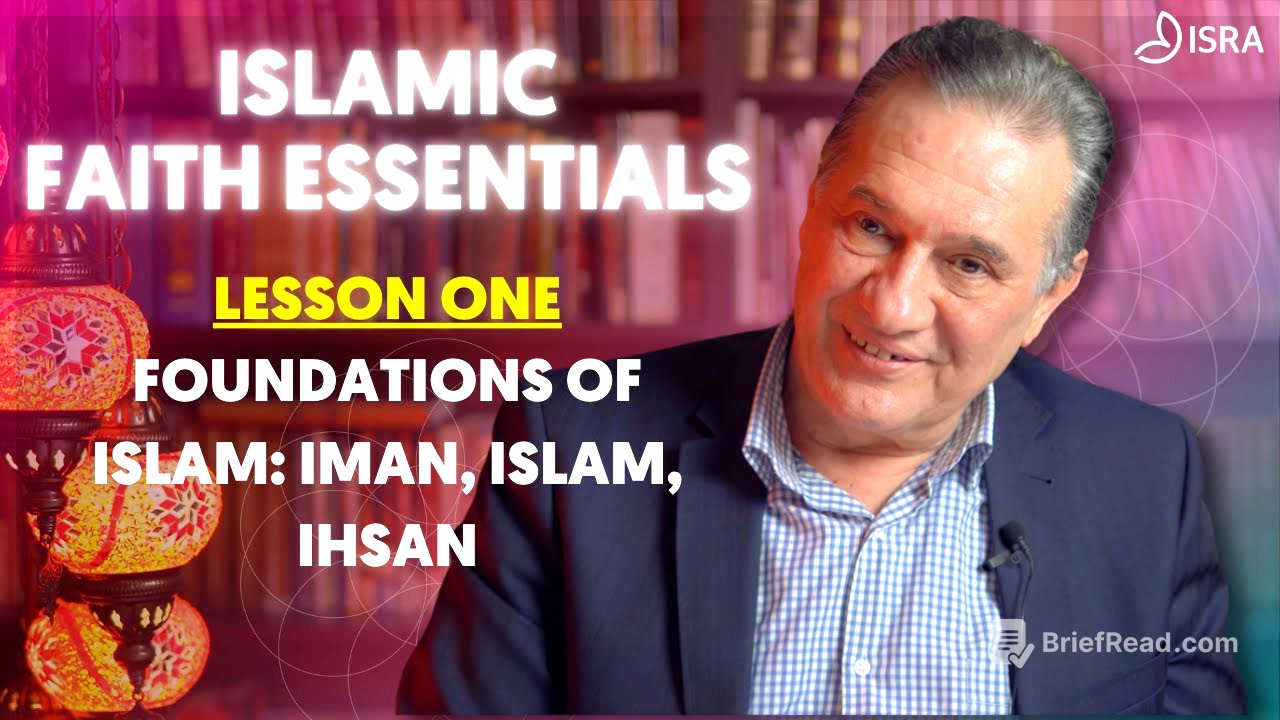TLDR;
This video introduces a seminar series on Islamic worldview, faith essentials, and Islamic theology. It begins by exploring the concept of worldview and its impact on beliefs, then discusses the three dimensions of Islam: Iman (faith), Islam (devotional practices), and Ihsan (spiritual excellence). The video also touches on the roles of proof in belief and disbelief, levels of Iman, the importance of perspective in understanding the universe, and the sources of knowledge in Islam. It concludes by highlighting the differences between materialistic, egocentric, and God-centric worldviews and their effects on one's outlook on life.
- The series will cover belief, disbelief, and the six essential articles of faith.
- The three dimensions of Islam are Iman, Islam, and Ihsan.
- Proofs are essential in modern times to overcome barriers to faith.
- Perspective shapes how we interpret the world around us.
- The sources of knowledge in Islam are the Prophet Muhammad, the Quran, and the universe.
Introduction & Overview of the series [0:00]
The speaker introduces a seminar series on Islamic worldview, faith essentials, and Islamic theology, aiming to complete it within a year. The series will cover topics such as belief and disbelief, the six essential articles of faith, and the concept of worldview. Worldview is defined as a philosophy of life or conception of the world, influencing beliefs, values, and behaviors. The speaker poses several worldview questions, including the nature of existence, the meaning of life, the existence of God, and the problem of evil and suffering, which will be addressed throughout the series.
Three dimensions of Islam [4:00]
The discussion begins with the three dimensions of "Deen," referring to religion in Islam. The speaker references the Hadith of Angel Jibril, where Jibril questions Prophet Muhammad about Islam, Iman, and Ihsan. Islam is described as the five pillars: testifying to the oneness of God and the prophethood of Muhammad, performing prayers, paying Zakat, fasting in Ramadan, and making pilgrimage to the Kaaba. Iman is defined as believing in Allah, His angels, His books, His prophets, the Last Day, and divine destiny. Ihsan is defined as worshiping Allah as if you see Him, or at least knowing that He sees you at all times.
The Hadith of Angel Jibril [4:29]
The Hadith of Angel Jibril is detailed, recounting how Jibril appeared in human form with striking features and questioned Prophet Muhammad about Islam, Iman, and Ihsan. The companions were astonished by Jibril's manner of questioning and affirming the Prophet's answers. This hadith highlights the foundational aspects of the Islamic faith, emphasizing the importance of both outward actions (Islam) and inward beliefs (Iman), as well as spiritual excellence (Ihsan).
The Foundations of Deen [9:00]
The three dimensions of Deen are further explained: Iman (faith), Islam (devotional practice), and Ihsan (spiritual excellence). Iman includes the six articles of faith: belief in the existence and unity of Allah, the existence of angels, the books of revelation, the messengers of God, resurrection and the afterlife, and divine determination. Islam is mainly the five pillars of Islam. Ihsan is to worship Allah as though if you see Allah. Definitions of belief (Iman), disbelief (Kufur), and hypocrisy (Nifak) are provided, noting that Iman involves affirmation by the heart and utterance by the tongue, Kufur involves rejection by the heart and utterance of disbelief, and hypocrisy involves rejection by the heart but utterance of belief.
Roles of Proof [16:50]
The importance of proof in belief and disbelief is discussed, noting that in modern times, knowledge plays a reversed role. Disbelief is now often rooted in knowledge (science and philosophy) rather than ignorance. Muslims must develop strong arguments to overcome barriers to faith, as removing these barriers is a form of jihad. The Quran provides proofs in seedlike forms that need to be blossomed into full explanations. Verses from the Quran are cited to support theological arguments, such as evidence for life after resurrection and the absence of discrepancies in the Quran. The miracle of the Quran is highlighted, emphasizing that it has remained unchanged and error-free for 1,400 years, unlike science, which is constantly evolving.
Levels of Iman [27:50]
The concept of "Yaqin" (certainty) is introduced as it relates to the levels of Iman. Yakin has three levels: Ilm-al-Yaqin (certainty by knowledge), Ayn-al-Yaqin (certainty by seeing), and Haqq-al-Yaqin (certainty by experiencing). The lowest level of Iman is imitative Iman, where belief is based on the beliefs of parents or society. The speaker uses the analogy of seeing smoke on a mountain to explain the three levels of certainty: knowing there is fire based on smoke (Ilm-al-Yaqin), seeing the fire (Ayn-al-Yaqin), and experiencing the heat of the fire (Haqq-al-Yaqin).
Perspective and Islam [33:00]
Perspective is crucial because it affects how we perceive empirical information. The Quran uses even the smallest examples to convey the truth of belief. Iman resides in the heart, but the mind serves as the entrance. There are two ways humans perceive the world: through meaning indicative by the name and meaning indicative by the letter. The first involves perceiving entities in themselves without looking beyond their names, while the second involves seeing each entity as a letter in a story written by the creator.
The Letters of the Universe [36:33]
The speaker uses the analogy of two books from Allah: the book of revelation (Quran) and the book of creation (universe). Just as the Quran is made up of Arabic letters that form words and sentences, the universe is made up of elements from the periodic table that form molecules and living beings. Each creation is a sentence from Allah written in the book of the universe, which we are required to read. The Quran itself calls its verses "ayah," and it also uses the same term for signs in the universe, encouraging us to seek the meaning represented by these signs.
Sources of Islam [41:10]
The main sources of knowledge in the Islamic worldview are the Prophet Muhammad as the messenger of God, the Quran as the verses of revelation, and the universe as the verses of creation. The universe is included as an objective source of information to test the truth of revelation, and human reason is the instrument to achieve that. The main worldview categories are materialistic, egocentric, and God-centric. Belief and disbelief produce marked differences in how one sees the world, with disbelief leading to a dark and grim view and belief giving a luminous and positive outlook.









